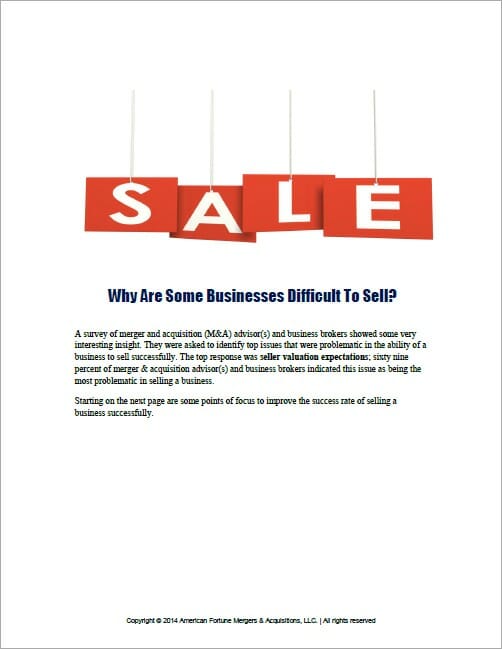How To Sell My Business In The Open Market
To sell a business successfully it takes much planning, experience and strategic positioning of a sale of a business. American Fortune’s marketing and advertising campaigns produce many inquiries. However, our goal is to insure that all marketing and advertising of businesses for sale is discrete and prevents anyone from identifying the name or location of your business. We carefully select and utilize local, regional and national media to advertise the sale of your business. Additionally we perform research and then target potential buyers with strategic marketing campaigns. Also, since we are recognized in the market for Mergers & Acquisitions and Selling of Businesses we receive numerous inquiries from Industry Buyers, Individual Buyers, Strategic and other buyers.
How To Sell My Business To a Strategic Buyer Vs The Financial Buyer
Financial buyers purchase your company’s future stream of profits, so their valuation of your business’s worth focuses on your profitability-and the likelihood of those profits flowing into the future. Since buying your company is probably riskier than putting money in government bonds, a financial buyer will demand a higher return on investment and will therefore usually make an offer that is within the normal range of multiples being paid for businesses like yours. By contrast, a strategic buyer develops an offer by estimating the value of your business from a synergies perspective. The review and analysis that a strategic buyer does begins with imagining what would happen if your company were grafted onto it’s platform. Companies make strategic acquisitions for many reasons, but here are three key ones: 1. A company might make a strategic acquisition to pump new life into an aging cash-cow product. 2. A company with a large, under-utilized sales force could buy your business so that its salespeople would have another product to pull out of their bag. 3. Another reason companies make strategic acquisitions is to get access to a distribution channel. Often, gateway acquisitions happen when a company wants to enter a new geographic market with big cultural or language barriers and corresponding high costs of acquiring customers. Additionally, acquirers (buyers) typically pay the most for businesses with the potential to grow.
How To Sell My Business From a Buyers Risk Vs Return Perspective
The price a buyer (investor) is willing to pay for an asset relates to how risky he or she perceives the future stream of profits to be: the riskier the investment, the higher the return an investor will demand. Today, buyers (investors) can put their money into relatively safe bonds and get a few percentage points of return, or they can buy a balanced portfolio of big-company stocks and expect perhaps a seven or eight percent return over time. But when buying a relatively risky business rather than a balanced portfolio, buyers (investors) will expect a much higher return on their money. It’s possible that a buyer (investor) may be seeking as much as 50 percent return for buying your business because he or she deems your business and the future stream of profits to be very risky.
When & How to Sell My Business
Nearly every business owner has heard that timing is important when selling a business. It is well documented that the timing of external factors like changes in the economy, availability of funding, and the rise and fall of interest and tax rates can have a profound effect on the value and the ability to sell a business. One large of private business owners who are or will be contemplating the sale of their businesses are Baby Boomers. Many studies point to the fact that many of these business owners hope to sell their business on the open market in hopes of funding their retirement and enjoying the benefits of a lifetime of hard work. Baby Boomer business owners may find that selling their company at the right time could be a means to obtain the funds they need to maintain a comfortable lifestyle during their retirement years. With their retirement resources often riding on a business sale, we are encouraging Baby Boomer business owners to explore the factors that may signal the best time to sell their company. An uncertain economy, low interest rates, and favorable capital gains tax rates are definitely things to seriously consider when and how to sell a business.
Considerations when Deciding: When & How to Sell My Business
The decision to sell your business can be a difficult and emotional turning point for the business owner, and the motivation for selling is often complicated and subjective. Reasons include retirement, health issues, desire for liquidity, partnership disputes, diminished interest, lack of operating growth capital, and lack of suitable heirs, among others. Regardless of the reason, the decision to sell a business involves extensive planning and preparation in order to receive the best price and most advantageous terms. A business owner with a sound strategy for selling his or her business is often better able to realize an attractive value for the company than someone who enters the process unprepared. In order to sell your business successfully the process typically includes financial appraisal and a formal business valuation, marketing the business, locating a prospective buyer, structuring the transaction, managing the buyer due diligence, negotiating and closing the transaction and post-close transaction. Despite the importance of having in place a clear-cut plan when deciding to sell, according to a recent survey of small business owners by M&A Today, 65% of business owners do not know what their company is worth and 85% have no exit or succession strategy. Worse yet, many business owners come up with a price in their mind without any form of business valuation so that they could defend the selling price from a position of strength.
Mistakes On “How To Sell My Business”
The typical business owner sells one business in his or her lifetime. On the contrary, corporate buyers often acquire multiple businesses each year, and financial buyers can be even more active. Invariably, inexperienced sellers can make mistakes that buyers can capitalize on. Some of the most common mistakes include the following:
Not knowing the value of the business – Private Business owners minimize profits to reduce taxes. Thus, their company’s financial statements often do not reflect the true profits and value of the business. As a result, many companies sold by their owners may be sold below market value.
Using a multiple or ratio to set price – There is no single multiple or ratio that applies to all privately held businesses and much depends on the industry type. Each business is unique and requires a comprehensive review and analysis of the company, as well as a strong understanding of the dynamics of the Mergers & Acquisitions marketplace, in order to determine a credible and defensible market value.
Selling a business at the wrong time – Many sellers wait too long to sell a business, not understanding that one should sell a business when the market is ready. Conversely many business owners spend a lifetime building their businesses, only to sell their business hastily, failing to recoup the actual worth of their business.
Trying to rush the sale of a business – Once an owner has decided to sell a business, they understandably wants the process to be over quickly. But preparation and selling a business including finding a qualified and willing buyer takes at a minimum of 6 to 24 months or even longer.
Negotiating with only one buyer – Although business owners may feel more in control when dealing with a single suitor, generating interest from multiple buyers can significantly increase the probability of selling a business at or close to the asking price.
Not understanding the buyer’s motives – Rather than emphasizing the business’ growth potential, sellers often dwell on the past performance. Buyers, however, are looking for future revenue projections, return on investment, growth potential, and synergy.
Inadequate documentation – Buyers expect documentation in the form of 3-5 years financials as well as documented procedures, policies and systems, including recast financial statements and five year pro-formas, backed by solid research and analysis that shows the potential of the business into the future.
Assessing and negotiating offers – Businesses rarely sell for all cash at the closing with balance being in a form of seller financing, earnouts or stock in the acquiring company. Instead, terms are often structured and can have complex tax and legal implications. Sellers should be able to assess and negotiate the terms of the transaction from every angle: personal, legal, and financial.
Trillions in liquidity are expected to be created over the next 10 years as aging Baby Boomers transition out of their closely held businesses to retirement. The three most common exit strategies are an outright sale of their business to a third party, recapitalization, or ESOP. The potential rewards of a successful business sale are great, but this complex and often time-consuming process should be expertly managed.
It’s very critical that as a business owner you carefully consider the “When to & How to Sell Your Business”. By Brian S. Mazar, CBI, MBA at American Fortune Mergers & Acquisitions.







